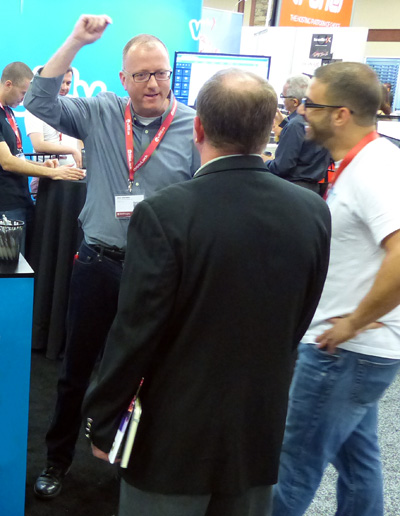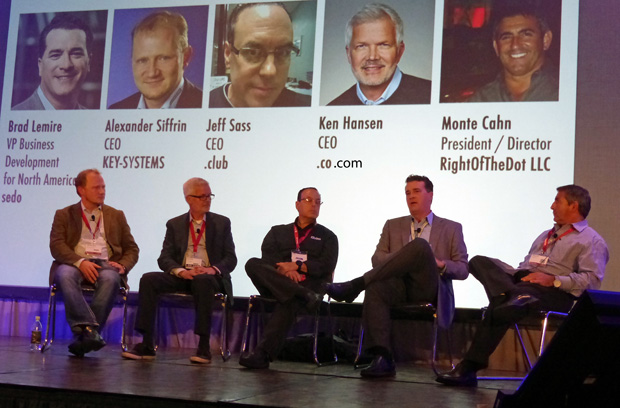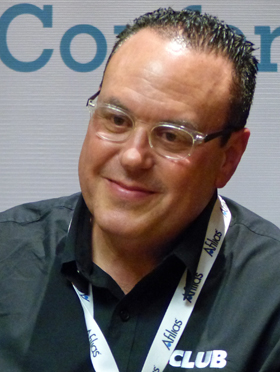|
That
development can take many forms, from landing pages to
mini-sites to full blown websites, but they all require
hosting. In fact, I have three separate hosting
accounts myself (two of which are reseller accounts
that allow me to host multiple domains on one
account). While DNJournal.com is a traditional
website with thousands of pages of content and high
traffic (requiring a more expensive account to accommodate
the higher bandwidth and storage needs), I use another
hosting account for small sites and extra email
accounts, including one used to send our free
newsletters and site updates to opt-in subscribers.
I use yet another hosting account to serve up custom
landing pages I have made for hundreds of domains
that are for sale (the landing pages pitch the reasons
to buy that particular domain and are usually accessed
by surfers who type the domain in their browser to see
what is there). Those domain were previously parked
but even though many had traffic, the downturn in
payouts dropped to the point where it made more sense
to direct that traffic to my own landers and emphasize
the availability of the domain for purchase. As
someone who has thousands of domains and has utilized
multiple hosting accounts for many years I would think
I would be an attractive potential client for hosting
companies, but I almost never see them in the places I
hang out professionally (at domain conferences and at
news and information sites online). Of course, many of
the biggest players in the domain space, including Go
Daddy, InterNetX, Rightside (parent
of eNom.com and Name.com) and many
others offer hosting but their emphasis at domain
conference has naturally been on their domain
services. Many others who are primarily hosting companies
offer domains (often free of charge with a
hosting account) but they rarely pitch their services
in the professional domain space.
|

|
So,
having had the "why is that?"
question at the back of my mind for several years, I
was pleasantly surprised to get a joint invitation
from the organizers of the first WorldHostingDays
conference ever held in the U.S. (WHD.usa,
staged at Seven Springs, Pennsylvania a couple
of weeks ago), and one of their top sponsors, InterNetX,
to attend my
first hosting conference. This would give
me a chance to get answers to several questions. Not only
"why we don't see more hosting folks on our side
of the fence", but also why a lot of domain
companies (especially new gTLD registry
operators) were going to WHD.usa. Plus, I was curious
to see how a hosting conference might be different
from the domain conferences I've become so familiar
with.
I found several key differences
at WHD.usa so,
to set the stage, I will start with those, then we'll
talk about why a lot of us barely know our brothers in
hosting and why it is the domain companies who are
trying to bring these should be lovers out of their separate
bedrooms. |
Location
is the first thing that set WHD.usa apart from what we
see in the domain conference world. Cologne,
Germany based WorldHostingDays (the
world's largest series of events for the hosting and
cloud service provider industry, anchored by
the massive WHD.global
conference that drew a record 6,300 attendees
to this year's event in Rust, Germany)
looks for remote resort locations for
their many events. Their theory is that putting
everyone together in one place with few surrounding
distractions is the best way to keep people onsite
and doing what they presumably came there to do, network
and build relationships. In the domain business
conferences are typically held in major cities like
Los Angeles, Las Vegas and Miami or Ft. Lauderdale.
There is a lot of action in those cities so people
like to visit, but that environment often results in
people spending a lot of time offsite and even
sleeping in the following mornings leaving conference
meeting rooms half empty. The
only time I've seen the WHD approach used on land in
our industry was when Sedo held an event for
their clients at the scenic Mohonk Mountain Resort
in New York State's Hudson Valley (right before the 2007
T.R.A.F.F.I.C. conference in New York City). To
this day, that remains one of the enjoyable events
I've ever attended. Everyone stayed together in one
fabulous resort, meeting together, eating together,
working and playing together in astonishingly
beautiful surroundings. So when I saw WHD.usa would be
held at the Seven Springs Mountain Resort in
western Pennsylvania's Laurel Highlands (about 90
minutes southeast of Pittsburgh) that was a big
reason I decided to go - and the show delivered the
kind of experience I was hoping for. 
A
ski lift and giant alpine slide
undulates down one mountainside viewed from the
front
entrance of the WHD.usa 2015 hotel at the Seven
Springs Mountain Resort in Pennsylvania. The
WHD approach was used at sea twice in our business
when Patrick Ruddell staged the only two domain
conferences that have been held on cruises ships
in DNCruise 2010 and DNCruise 2011. Both
of those events were well received by those attended
and in Pennsylvania I was told that WHD had also
considered putting their first U.S. show on a cruise
ship. However, their research reportedly showed that
people were divided on the cruise conference idea,
with some loving it but others having no interest in
being that far away from it all. Certainly
there are pros and cons to all of the options, big
city, remote resort and at sea. I have enjoyed them
all but found WHD.usa (as was the case with Sedo's
Mohonk event) to be a very welcome change of pace,
so perhaps we will see more of a mix in the domain
business one day as well. The
other big difference at WHD.usa compared to domain
conferences was a heavy emphasis on creating networking
opportunities in a more socially oriented environment.
At domain shows the networking goes on in the
hallways, perhaps a speed networking session and, of
course, at the usual show parties after the sun sets.
Like all conferences, WHD.us had the hallway
networking and a night time party (a great one
sponsored by Weebly.com)
but at lunch time every day they offered outdoor
activities like Segway and ski lift rides, a giant
alpine slide and even bowling. Half of the second day
of the two-day event was devoted entirely to major
outdoor team events including a sky high zip
line experience, shooting clays and a golf
tournament. These were all great events that
really helped people get to know each other better on
a personal level by interacting outside of the
usual business environment. 
A
WHD.usa 2015 attendee riding a
mountaintop zipline above
Pennsylvania's Seven Springs Mountain Resort
seen in the valley below. There
was one other difference that domain audiences usually
don't see. WHD.usa offered both a standard
ticket ($349) and a VIP ticket ($999). The
latter came with several perks including:
-
VIP status with a
distinctive badge and a valuable VIP present (one
present per room and only in the 7Springs Ski and
Mountain Resort)
-
Special VIP seats for
all main.FORUM talks and a guaranteed place in all
hosting.SESSIONs
-
Special lunch
restaurant with gourmet VIP catering
-
VIP concierge for all
your needs
-
VIP treatment at the
hotels (free mini bar)
-
WHD Connect (up to
five Contacts)
It was nice to have the
VIP option if you wanted to spend the money but the
nature of the service resulted at times (like lunch
and dinner) when the crowd was divided. One of the big
appeals of domain conferences has always been that a
newcomer on a limited budget could buy a ticket and
wind up sitting next to one of the biggest names in
the industry like a Frank Schilling or a
Rick Schwartz at lunch. Having said that, I
understand that promoters have to recoup their costs
(and hopefully turn a profit) and a VIP ticket
is one way to generate more revenue. It also accommodates people who want to pay more for a
higher level of service, something that is standard operating
procedure in the business world. I didn't hear any
complaints about it at WHD.usa nor see any instances
where anyone had an issue with it as there were still
plenty of places to meet and chat with high level
executives including the parties, hotel bars and
social networking events.
|

Chris
Sheridan
(left) holding court at the Weebly.com
booth in the WHD.usa 2015 Exhibition
Hall |
Of course, domain shows
and hosting shows also have some things in common.
Both give attendees a chance to meet service providers
face to face. At domain events you can meet the people
who run the brokerages, aftermarket sales platforms
and monetization companies - and you may even sell a
few domains to fellow guests. At hosting conferences much
of the spotlight is focused on those who provide
products and services to hosting company owners,
affiliates and resellers, people like Odin, CPanel,
Ascio, hardware providers like HP and Dell
and others like website builder Weebly.com
(represented at WHD.usa by a former domain industry
leader, Chris Sheridan). Weebly hopes to get
hosting companies to incorporate their service in
hosting accounts to make it easy for people who have a
domain and hosting account to build their website
without looking any further.
As I noted earlier, while
we rarely see hosting companies (other than those
major domain companies who also offer |
|
hosting) at
domain conferences, there were a lot
of domain industry people at WHD.usa. InterNetX, Sedo,
.CLUB, Key-Systems, OpenSRS and Radix
all had people there and also helped sponsor
the event. Others sent attendees, especially
companies operating domain registries. What
was the attraction for them? .CLUB's VP Of
Business Development, Michele Van Tilborg,
summed that up in a tidy package for me -
saying it all comes down to getting your
extension included in hosting
packages. |
As I mentioned earlier,
many hosting companies offer a free domain to new
hosting clients. However, the domains are often
limited to specific extensions, so registry
operators, especially those running new TLDs
that need to gain recognition and market share, want
to make a case as to why hosting companies should offer their
extensions). An added bonus is that someone who is
getting their domain with a hosting package obviously
plans to build something on the domain. Having
invested in building a website, they are much more
likely to renew their domain year after year.
Domain
industry pioneer Monte Cahn, who co-founded new
gTLD consultancy RightOfTheDot,
noted another huge incentive for new gTLDs to cut
deals with hosting companies. "The most
important thing for new gTLDs are to have live websites
up and running as must as possible which will give
them the kind of relevance and credibility
legacy TLDs .com, .net and .org have," Cahn said.
Those new TLD registries
who understand their success hinges on their
marketing efforts also take every opportunity to
talk about their extensions, no matter how far afield
they have to go to do that. WHHD.usa featured one
panel discussion devoted solely to domain names
and that gave moderator Monte Cahn and his panelists
(from new and established companies alike) Alexander
Siffrin
(CEO, Key-Systems), Ken Hansen (CEO, .CO.COM), Jeff
Sass (CMO, .CLUB) and Brad Lemire (VP,
Business Development for North America, at Sedo) a
high profile opportunity to talk about their offerings
and evangelize for
|

RightOfTheDot
Co-Founder Monte Cahn |
|
the domain industry in
general. Helena Schindler, the Global Sales
Manager at InterNetX, also had her own solo
presentation on domains in one breakout session
(though InterNetX's primary reason for being at this
show was to promote there robust hosting
services).

Domains
took center stage in this session at WHD.usa
2015 |
I'll
close with my primary question - given how
closely intertwined domains and hosting are - why
don't we see hosting companies promoting their
services at domain conferences? Cahn said,
"Domain conferences are primarily focused on
domain investors with a few end users. The core value
to a hosting company is having a domain be a hosted
website so it is probably more important to them
to have domain presence at a hosting conference than
vice versa. Go Daddy, 1&1 and Web.com
already dominate the hosted domain market
because it is part of their upsell and platform and
system." That being the case most hosting
companies may not think they will get enough return on
their investment to put resources into reaching in
professional domain investor market.
|
Still,
.CLUB's CMO Jeff Sass thinks some hosting companies
may be making a mistake by underestimating the
value of the domain name. They often give them away free
of charge with a hosting package, but Sass
noted. "the cycle starts with an idea
and then a specific domain name that conveys
that idea to the consumer. If people can't get a relevant
domain, they may not even take the idea to the next
step, which is getting a hosting account - the last thing they consider in the
process. If a hosting company makes sure they can
offer the client a relevant domain they have a much
better chance of getting them to complete the process
and order hosting."
For
the time being at least, it looks like it will be up
to the domain companies to do the initial wooing in
the domain-hosting relationship and it is good that
they have taken the initiative to do that
because more cross-pollination, regardless of
who asks the other out on a date first, should benefit
both sides as the Internet continues its relentless
expansion.
|

.CLUB
CMO Jeff Sass |
|


















